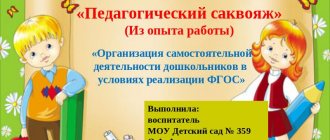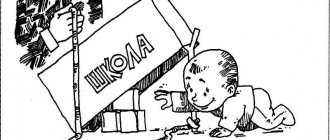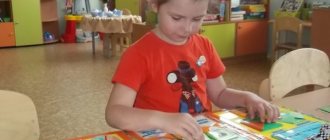Basic models of the educational process
To determine which model of the educational process will be most optimal in a child care institution, you need to study the main models that exist in kindergartens today and are successfully practiced:
1. Educational.
Today this model is one of the most common in children's educational institutions. The principle of this model is to separate different teaching methods and build each individual method on its own logic.
The adult in this model plays the role of a teacher. He takes full initiative in what and how the children will do. He directs their activities almost the entire time they are within the kindergarten.
To implement this model, the teaching of preschool children and the educational environment are rigidly programmed in advance using various techniques. The educational process itself is based on discipline. It is a lot like a school uniform.
The subject environment in the group is organized in such a way as to support the classes being conducted. Therefore, each subject plays the role of a teaching aid. The educational model is attractive because it is highly technological, the teacher can easily understand and apply it.
Teachers also have many notes issued by methodologists and practitioners. Therefore, he can easily find material for classes.
2. Complex thematic
This model is slightly different from the previous one. It is based on the fact that the basis of the content is the topic. This topic is presented to children in an emotional way and communicated in the form of knowledge. Moreover, children not only receive ready-made knowledge, they seem to receive it during their own activities and experience them.
The teacher no longer plays the role of a teacher, but a partner for children, thereby becoming one step closer to them psychologically.
A teacher operating within this model is more free in his approaches. He can be creative.
The teacher himself determines what topics need to be introduced into classes. He also organizes the systematic nature of the educational process. Education for preschool children is structured in such a way as not only to develop the child’s personality, but to expand his understanding of the world around him.
This model is especially popular with pediatric speech therapists. Since selecting topics and creatively implementing them during classes requires great pedagogical and creative potential.
3. Subject environment.
The educational process is based on the principles of projection on the subject environment. The teacher organizes the subject environment in the group. He selects educational materials and encourages children to try to interact with them.
The essence of this model is well revealed - the Montessori model.
This approach relies on the self-development of the preschooler, limiting his education to the subject environment. Therefore, there is no systematicity in the educational process. The child’s horizons narrow sharply. At the same time, the teacher does not need to creatively organize the educational process.
The model is based on technological solutions.
What is the basis for teaching preschool children in kindergarten?
Let's distinguish two groups:
- forms of work with preschoolers that are adequate to their age-related abilities. Focus on the development of all types of child activities, especially play, since it is the leading activity at this age.
- The education of preschool children is structured in such a way that they interact with adults. They play together, read together, communicate, do various physical exercises, play music, conduct research, learn something new.
Education of preschool children in preschool educational institutions
There are the following principles for organizing the educational process in kindergartens:
- Teaching preschool children requires taking into account the characteristics of each child related to his age and individual personal development. You also need to take into account the interests of children.
- Educational and educational tasks must be solved jointly with each other.
- It must be taken into account that the leading activity for children of this age is play. It is also necessary to alternate the activities of children.
- The teacher is obliged to structure his interaction with each child in such a way that it reflects his respect for him.
- It is necessary to create conditions that have a positive effect on the process of developing different abilities in children.
- It is necessary to provide preschool teachers with all the conditions for developing their competence and level of skill.
- It is necessary to encourage all participants in the educational process to implement the principles of the Declaration of Children’s Rights.
I.P. Podlaska believes that it is necessary to clearly distinguish the individual elements of the system. This will allow you to analyze the connections that exist in it and monitor the relationships between them. And this will improve the practice of the educational process.
This means that in order to manage the education process, it is necessary to have a systematic approach.
To do this, it is necessary to deeply theoretically analyze the process of education in kindergarten and the education of preschool children, as a structure in which there are certain patterns.
During the educational process, the teacher purposefully teaches children, develops their personal qualities, educates them, and helps children learn to self-educate.
The organized pedagogical and educational process in kindergarten is a system of relations between a teacher and a child, which sets the goal of teaching preschool children, raising each child as a fully developed personality and teaching him the necessary social skills.
As a result, the child develops diversified. He improves physically, his aesthetic and artistic perception and cognitive activity improve. His social and personal position is formed.
The importance of the educational process
The importance of the educational process is to create conditions that are most suitable for the timely launch of a personality formation program. As a process, the education of preschool children should be aimed at achieving specific goals and objectives. It should be gradual and go through different stages. You also need to help your child gain experience in different activities.
The educational process in kindergarten has the same principles as the educational process in general. It has the same structure. Also, the logic of its construction is no different. However, there are some specific features characteristic of teaching children in kindergarten. These features are associated with the age of children and the pattern of their development in the preschool period.
Moreover, in each institution, teaching preschool children is unique in some way. Even within one group in one institution, each child has its own approach. Several parties take part in the design of the educational process in any institution. The state plays its role. A lot depends on the parents of the children and the preschoolers themselves. But the key role, of course, lies with the educator.


